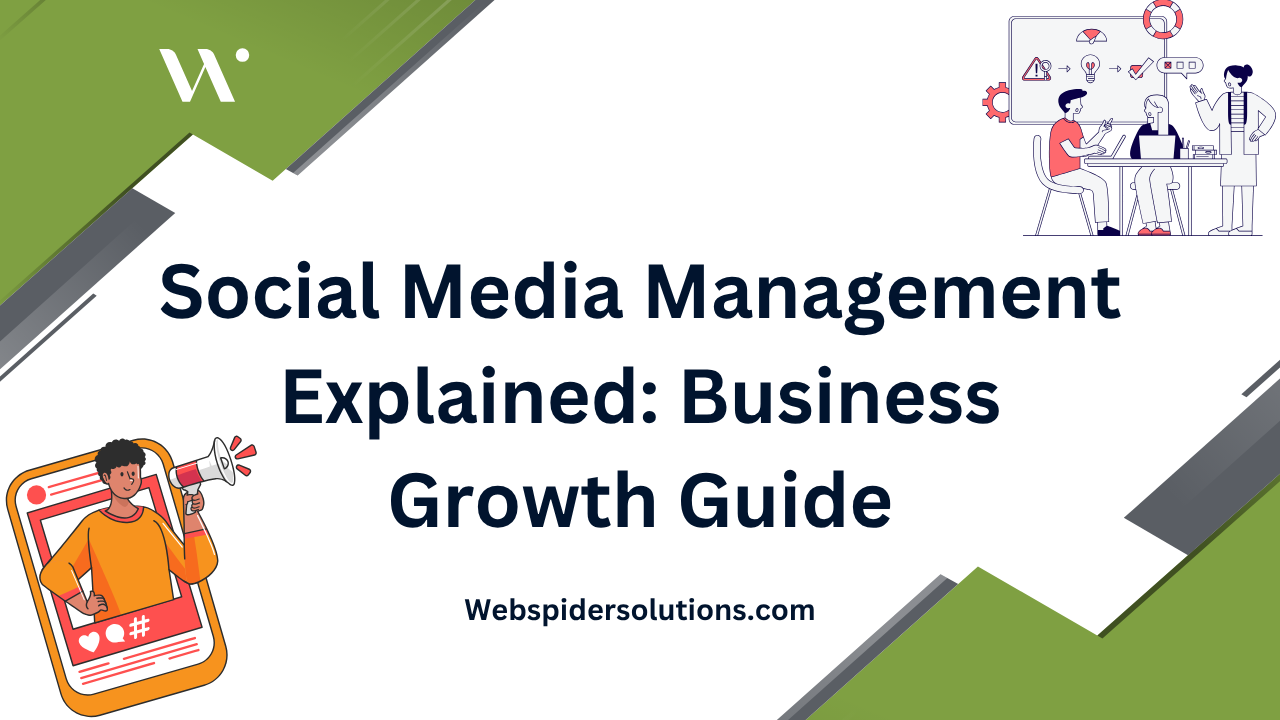Over 91 percent of businesses now use social media to reach their audience, yet many struggle to turn likes and comments into real results. With shifting platforms and constant algorithm updates, staying ahead can seem impossible. Learning what social media management truly involves helps businesses build trust, connect with customers, and track the impact of every post. Unpacking these strategies can be the difference between getting lost online and making lasting connections.
Table of Contents
- Defining Social Media Management For Businesses
- Major Social Platforms And Their Distinct Roles
- Core Processes And Key Strategic Features
- Business Benefits And Real-World Use Cases
- Risks, Costs, And Measuring Social Roi
Key Takeaways
| Point | Details |
|---|---|
| Strategic Importance | Social media management is crucial for enhancing brand visibility and driving customer engagement through targeted digital interactions. |
| Platform Differentiation | Each social media platform has unique characteristics that can be leveraged for specific marketing objectives depending on the target audience. |
| Core Roles | Social media managers must fulfill multiple roles, including content creation, data analysis, and community management, to effectively drive engagement. |
| Risk Management | Successful social media strategies require careful consideration of time investment, reputation risks, and the need for continuous performance measurement to ensure ROI. |
Defining Social Media Management for Businesses
Social media management is the strategic orchestration of a company’s online presence across digital platforms to achieve specific business objectives. According to Career Compass, it involves developing and executing strategies that leverage online content and interactions to drive organizational goals.
At its core, social media management encompasses several critical functions. As Berklee explains, this includes:
- Content creation tailored to specific platforms
- Digital marketing campaign development
- Real-time customer engagement
- Performance tracking and analytics
- Brand awareness enhancement
Effective social media management goes beyond simply posting content. It requires a nuanced understanding of audience behaviors, platform dynamics, and strategic communication. Professionals in this field must blend creativity with analytical skills, crafting messages that resonate while simultaneously measuring their impact.
For businesses seeking growth, social media management represents more than a marketing function. It’s a dynamic communication channel that enables direct interaction with customers, builds brand trust, and provides valuable insights into market preferences. By implementing a robust social media strategy, companies can transform online interactions into meaningful business opportunities.
When exploring social media management, businesses should understand the importance of a strategic social media presence, which can significantly influence market perception and customer engagement.
Major Social Platforms and Their Distinct Roles
Navigating the social media landscape requires understanding the unique characteristics of each platform. According to Rochester University, social networks vary significantly in their features, user demographics, and primary functions.
Each platform offers distinct strategic opportunities for businesses. A comprehensive breakdown reveals:
- LinkedIn: Professional networking and B2B marketing
- Instagram: Visual storytelling and brand engagement
- TikTok: Short-form video content and viral marketing
- Facebook: Broad audience reach and community building
- YouTube: Long-form video content and educational marketing
As Oklahoma State University Extension emphasizes, selecting the right platform depends on your target audience and specific business objectives. Not every platform will deliver equal results for every business model.
Businesses can maximize their social media strategy by comparing platform strengths through comprehensive platform analysis. Understanding each platform’s unique ecosystem allows for more targeted, effective marketing approaches that resonate with specific audience segments.

Core Processes and Key Strategic Features
Social media management involves a complex set of strategic processes that go far beyond simple content posting. According to Macrothink Institute, social media managers play multiple critical roles that collectively drive brand success.
The core roles of social media management include:
- Social Analyst: Interpreting data and audience insights
- Content Manager: Creating and curating engaging digital content
- Social Media Strategist: Developing comprehensive digital communication plans
- Community Manager: Building and nurturing online brand communities
Successful social media management requires a holistic approach that integrates traditional media strategies with digital communication techniques. Each role contributes unique skills to create a comprehensive digital marketing ecosystem that enhances brand visibility and engagement.
Implementing these strategic features demands technical proficiency, creative thinking, and continuous adaptation. Businesses looking to optimize their social media approach can explore comprehensive digital marketing strategies that align with their specific organizational goals and target audience expectations.
Business Benefits and Real-World Use Cases
Social media management has transformed from a peripheral marketing activity to a critical business strategy. According to Arkansas State University, it plays a pivotal role in building brand awareness, driving customer engagement, and fostering long-term customer loyalty.
The key business benefits of strategic social media management include:
- Direct Customer Interaction: Real-time communication and feedback
- Brand Visibility: Expanding reach beyond traditional marketing channels
- Cost-Effective Marketing: Low-investment, high-return communication strategy
- Data-Driven Insights: Gathering audience behaviors and preferences
- Competitive Intelligence: Monitoring industry trends and competitor activities
As University of Phoenix highlights, social media platforms provide unprecedented opportunities for businesses to create sales opportunities, build trust, and collect valuable market intelligence. Each interaction becomes a potential touchpoint for conversion and brand storytelling.
To maximize these benefits, businesses can explore comprehensive social media marketing strategies that unlock growth potential. The key is developing a nuanced, data-informed approach that goes beyond generic content posting and focuses on meaningful audience engagement.
![]()
Risks, Costs, and Measuring Social ROI
Social media management involves strategic investments and potential challenges that businesses must carefully navigate. According to Wisconsin Bar Association, measuring effectiveness through comprehensive analytics is crucial for understanding true return on investment.
Key risks and cost considerations include:
- Time Investment: Significant resources required for content creation
- Reputation Management: Potential negative interactions or brand perception risks
- Platform Algorithm Changes: Constant shifts in social media visibility
- Content Compliance: Ensuring legal and ethical communication standards
- Technical Resource Requirements: Ongoing training and tool investments
As Social Media Magazine emphasizes, successful social media management demands data-driven strategies that continuously adapt to evolving digital landscapes. This means developing robust measurement frameworks that go beyond superficial metrics like likes and shares.
Businesses seeking to optimize their social media investment can learn comprehensive strategies for measuring marketing ROI, ensuring that every digital interaction contributes meaningfully to overall business objectives. The goal is transforming social media from a cost center to a strategic growth engine.
Unlock the True Potential of Your Social Media Strategy
Managing social media effectively is more than just posting updates. This article highlights the challenges businesses face such as the need for strategic content creation, real-time engagement, and tracking ROI to turn online presence into tangible growth. If you are struggling with navigating multiple platforms or measuring your social media impact, you are not alone. The right approach demands creativity, analytics, and constant adaptation.
At Web Spider Solutions, we understand these pain points and offer tailored social media management solutions designed to amplify your brand visibility and customer engagement. Whether you are focused on business-to-business marketing or looking to craft a compelling story that resonates with your audience, our expertise covers it all. Explore how we help companies dominate their digital space with integrated strategies by visiting our B2B Marketing Archives and find inspiration in our Stories Archives.
Ready to transform your social media from a challenge into a strategic advantage? Visit Web Spider Solutions today to schedule your free consultation and start building a tailored plan that drives real business growth.
Frequently Asked Questions
What is social media management?
Social media management is the strategic orchestration of a company’s online presence across digital platforms to achieve specific business objectives, involving content creation, engagement, performance tracking, and brand awareness enhancement.
Why is social media management important for businesses?
Social media management is crucial for businesses as it allows for direct interaction with customers, builds brand trust, enhances visibility, and provides valuable insights for market preferences, transforming online interactions into meaningful business opportunities.
What are the major social media platforms businesses should consider?
Businesses should consider platforms like LinkedIn for B2B marketing, Instagram for visual storytelling, TikTok for short-form videos, Facebook for community building, and YouTube for long-form content to align their strategies with specific audience segments.
How do I measure the ROI of my social media efforts?
Measuring the ROI of social media efforts involves tracking comprehensive analytics that assess customer engagement, brand visibility, and conversion rates, ensuring alignment with overall business objectives rather than relying solely on superficial metrics like likes and shares.
Recommended











